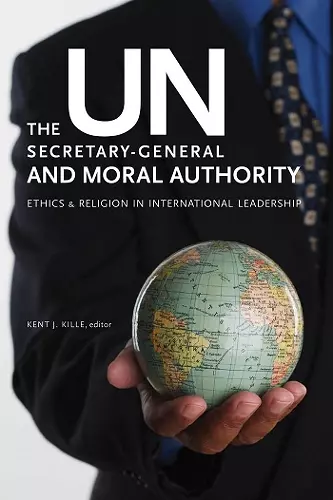The UN Secretary-General and Moral Authority
Ethics and Religion in International Leadership
Format:Paperback
Publisher:Georgetown University Press
Published:29th Dec '07
Currently unavailable, and unfortunately no date known when it will be back

What can be learned from the ethical principles and religious beliefs held by previous secretaries-general? How have these ideas affected the office itself and the claims of many for its moral authority? This book offers richly detailed case studies in ethics and statesmanship at the UN. It is a welcome and much-needed addition to our understanding of how the UN works. -- Joel H. Rosenthal, president, Carnegie Council for Ethics in International Affairs
Provides insight into how religious and moral leadership functions in the realm of international relations, and how the promotion of ethical values works to diffuse international tensions and improve the quality of human life around the world.Once described by Trygve Lie as the "most impossible job on earth," the position of UN Secretary-General is as frustratingly constrained as it is prestigious. The Secretary-General's ability to influence global affairs often depends on how the international community regards his moral authority. In relation to such moral authority, past office-holders have drawn on their own ethics and religious backgrounds - as diverse as Lutheranism, Catholicism, Buddhism, and Coptic Christianity - to guide the role that they played in addressing the UN's goals in the international arena, such as the maintenance of international peace and security and the promotion of human rights. In "The UN Secretary-General and Moral Authority", contributors provide case studies of all seven former secretaries-general, establishing a much-needed comparative survey of each office-holder's personal religious and moral values. From Trygve Lie's forbearance during the UN's turbulent formative years to the Nobel committee's awarding Kofi Annan and the United Nations the prize for peace in 2001, the case studies all follow the same format, first detailing the environmental and experiential factors that forged these men's ethical frameworks, then analyzing how their "inner code" engaged with the duties of office and the global events particular to their terms. Balanced and unbiased in its approach, this study provides valuable insight into how religious and moral leadership functions in the realm of international relations, and how the promotion of ethical values works to diffuse international tensions and improve the quality of human life around the world.
This is an excellent volume and should prove useful and intriguing for students of all collegiate levels, as well as for researchers, diplomats, ethicists, persons of faith, and anyone generally interested in the U.N. and international peace and security. Human Rights & Human Welfare Well worth the effort to all those interested in the future of humanity. Religious dynamics shaping societies will continue to dominate conflicts and relations in the next century, and those working in the fields of intelligence, international law, military science, conflict management, and political science would all benefit from deeper understanding of these connections. International Journal of Intelligence Ethics
ISBN: 9781589011809
Dimensions: unknown
Weight: 499g
384 pages